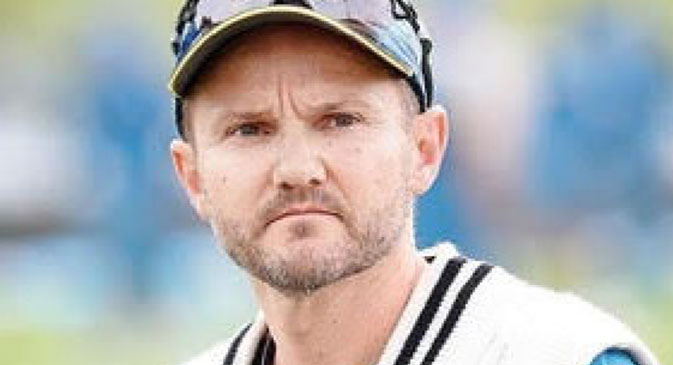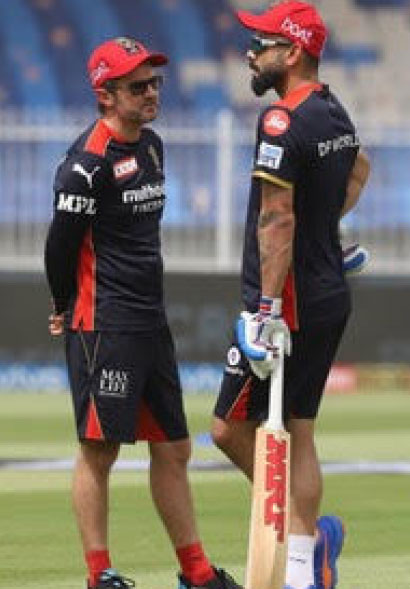Mike Hesson
Mike Hesson
- Coach Profile
- Cricket
A debilitating back injury ended Mike Hesson’s playing career in his early 20s, but looking back, he’d say things have worked out pretty well from there. His six-year stint as Black Caps coach saw the side progress to the number-one ranked T20 side in the world, the test team rise to second in the rankings, and in a life highlight for many Kiwi cricket fans, he steered the ODI team to its first Cricket World Cup Final in 2015.
Having coached domestically, internationally, and as a Director of Cricket for an IPL franchise, Hesson’s experiences are vast, but it was some of his earliest appointments that laid the foundation for his coaching philosophy. He was appointed as Otago’s Director of Cricket aged just 21 following his injury, but with plenty of playing experience both domestically and overseas, felt he was ready for the challenge. “I coached so many different teams, schoolgirls to men’s teams and everything in between,” he says. “That gave me a really good understanding of coaching, the range of personalities and skillsets within teams. I transitioned pretty quickly from a player mindset to applying the experience that I had to add value, finding a style that suited each individual. And, to be fair, making plenty of mistakes along the way, but having to learn fast off the back of them.”
Those lessons, and his passion for the game, has taken Hesson around the world. To Argentina for his first international Head Coach role in 2003, Kenya in 2011, and to the Cricket World Cup Final in 2015. Following some commentary work and a stint on the ICC’s Cricket Committee as a coach representative, he has spent four years as Director of Cricket for Royal Challengers Bangalore (RCB) in the Indian Premier League (IPL) franchise T20 competition.

There’s a vast range of skill, experience, resourcing and scheduling across those different environments. Whilst there are cultural and language barriers to navigate, one thing that Hesson’s learned through his career is that the fundamentals of a good coach are universal. “I believe coaching is understanding how and where you can make a positive impact,” he shares. “My perspective was understanding a player’s journey first, and how they got to where they are, before trying to intervene. In Argentina, players didn’t necessarily know how to fix things themselves, so a big part of my role was drawing back and entering where the issue actually was, and putting that in language they could understand. From a pure coaching perspective, that was an exciting challenge.” Working with some of the game’s biggest names in the IPL meant the skill level was different, but the approach wasn’t. “You have to be aware that all of those players have had multiple coaches across national and franchise teams, so how are you going to be different? It was more about relationship building and gaining the trust of the player, and working out where you can add the value whether it’s technical, tactical, or off-field support.”
The IPL is a high-profile, high-value centrepiece of the cricket calendar in India. Franchises are run more like businesses, requiring more than just cricket nous from the Director of Cricket. “I oversaw everything for both RCB’s men’s and women’s teams, from auction strategies and scouting, the recruitment of the squad and support staff, appointing the Head Coach, working in with security, the marketing and social media teams,” he says. “You’re reporting up to the Board and owners as well as down to the playing group. It’s your role to make sure everyone sticks to the franchise’s philosophy, reminding them of the way we’ve all agreed to play the game.” Between all of that, he did still try to find time to coach as well. “I would try and spend time with players I already had a relationship with, see if I could add value, keep involved in team meetings, and make sure everyone was comfortable.”
Cricket is perhaps unique in the relationship between coach and captain, where the captain oversees tactical decisions in the moment on the field. Hesson sees that relationship as one of the most critical a coach can have. “It’s your job to find the most suitable captain for the group you have,” he says. “They need to connect with the players, and if you’re any good as a coach, you should be able to be malleable to adapt to suit that person. It’s not the role of the captain to suit you. From there, you allocate job responsibilities and identify how you can help each other to do your jobs.”
Hesson’s travels throughout the cricketing world have given him plenty of insights into high performance sport. There’s a lot of advice he could share with aspiring HP coaches, but the first thing that comes to mind is a question. “What type of coach do you want to be; a hands-on coach, or a head coach? There’s no wrong answer, it’s what best suits you. If you love rolling your sleeves up, interacting with players and doing the technical skill stuff, then you’ll probably find an assistant or specialist coach role is more for you, and there’s a lot more of those roles across sports now.” For those aspiring to become a head coach, his advice is to strengthen all the strings to your bow. “You have to have the skills to add value in the technical and tactical areas, but you get pulled down a lot of different paths at the same time which might not be what you signed up for as a coach,” he says. “You’re doing budgets, you’re in board meetings, making presentations. It’s more management skills than hands-on coaching.”
He knows there’s value and validity in both pathways, and the key is finding what you’re passionate about so you can ride the inevitable highs and lows. “High performance coaching is an amazing job,” he says. “You’re at the cutting edge of your sport, you can have some amazing experiences around the world, but it’s not all roses. You can feel isolated and lonely.” As a member of the Sports Performance Coaches NZ (SPCNZ) board, he believes it will offer a great network to coaches in good times and when they need additional support or advice, independent of an NSO. “There’s that old line about coaching that you’re either fired or waiting to be fired,” he laughs. “It’s an amazing profession to get into, but there’s a hole in the system without that support in a high stress environment. Having a group of coaches who understand the situation you’re in and who can provide support – whether that’s peer learning, legal or sports psychology support, a whole range of things specific to the needs of HP coaches – will add so much value.”
Looking back on his career so far, Hesson has many highlights – working with some of the greatest players in the game at RCB is right up there, as is that incredible run in the home World Cup in 2015. But perhaps in evidence of his passion for coaching, his other highlight isn’t from Chinnaswamy Stadium or Eden Park. It’s from Dunedin Airport. “We had won Otago’s first title in 21 years with the Volts,” he recalls. “The airport was filled with people, there were bagpipes playing, so many people celebrating that win. I still get goosebumps thinking about it now. It’s a key memory I’ll never forget as a coach.”
